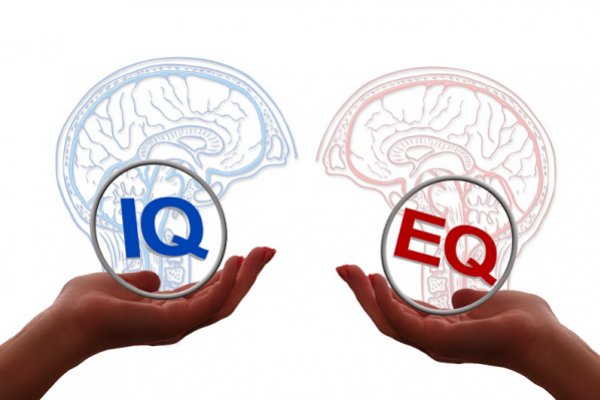A friend of mine, during a recent conversation, spoke about how in his organisation, those who were considered great leaders struggled with the changes brought about by COVID-19. He also spoke about a few leaders who had emerged and expressed his surprise at the way they adapted to the change, understood the team’s struggles, and were able to hold their teams together — provide containment and leadership.
Which led me to ponder over the fact that there is an inherent bias in organisation and family systems for the intellect — the intelligence quotient (IQ). The entire education system is built on rewarding individuals for competence and the ability to reach certain milestones to start a career. We disproportionately reward the person with ‘smarts.’ Undoubtedly, IQ is essential — it enables us to build capability. But the fact is, it is not the only important factor that helps one have a successful career.
As we move from studies and education to the world of work and careers, there is an addition to what is required and expected of us: Emotional Intelligence (EI).
From the moment someone joins a system, they have to relate and work within a subsystem and across subsystems. The contrast of what one is prepared to do and walks in to versus what is expected can leave anyone grappling for a foothold. It’s like one has practiced for a Kathak recital but on the stage, the music for Bwola dance is played, leaving the person stunned and perplexed. It’s a major shift from what we have overindexed until this point, which is IQ to what is needed as one steps into the world as an adult which is EI.
EI gives us the ability to detect the authenticity of others’ emotional expressions, and express our own emotions clearly. It gives us the ability to comprehend emotions, understand how basic emotions combine to form complex ones, set emotion regulation goals, and remain authentic in our own emotional expressions.
The term Emotional Intelligence was made popular by psychologists John Mayer and Peter Salovey in 1990. Dr. Daniel Goleman built on the concept of EI with his book Emotional Intelligence: Why It Can Matter More Than IQ and ensured it can be quantified (Emotional Quotient or EQ), learnt, and applied, making it a sought-after skill.
What is it?
Goleman described emotional intelligence as a person’s ability to manage and express their feelings appropriately and effectively. According to him, EI has a great influence on the success of an individual at the workplace. It is important to recognise it as an ability and not an inherent virtue — something to be observed and developed and not a quality only certain demographics (people/ personalities/roles) are supposed to have — typically women or Human Resource professionals.
Goleman describes five emotional intelligence components - Self-awareness, Self-regulation, Motivation, Empathy, and Social Skills.
Emotional awareness (awareness of emotions in self and others) is the cornerstone of emotional intelligence. How aware are you of your emotions, and how are you able to engage with them to leverage and manage them? The journey can only start from within.
I’m reminded of another incident from a large IT services organisation. There was this leader who, if something was amiss in the deliverable, would scream at his team members. ‘What the hell are you doing! I clearly told you what to do; see how your stupidity ruined the entire project! Don’t understand where you guys learn your stuff and come to work!!’, he’d yell. In the next hour, he’d go out with the team member and be very normal. In his mind, it was over; he was angry and gave feedback.
Whereas team members, scathed by the incident, started reaching out to other teams to see whether they can move out of this burn. Until one member, a junior raised an official complaint. The manager of this leader knew what was happening but never called it out because he was getting the results he needed. So the leader never got real feedback on his misbehaviour which is a result of his low empathy and social awareness.
While logically we understand the need for change at an emotional level, we resist change as it causes anxiety. This results in ambivalence; we are conflicted with wanting and not wanting the change at the same time; self-awareness, therefore, has to lead us to manage ourselves better. It should prevent us from getting trapped in our own realities and our agenda.
Another friend described how their Digital Transformation (yes, digital transformation) Head wanted to have all her team members colocated in the same space, so every hire had to be moved to the same city she was in and work out of the office every day. But since the pandemic hit India, everyone is working remotely, and no deliverable was dropped. My friend lamented about the stress the system earlier was put through by this leader to ensure everyone relocated and how this led to an unnecessary and avoidable churn in the team.
Emotional Intelligence also requires us to understand the realities of others. Recognising others’ realities brings us into the space of empathy. We need to think beyond ‘me’ to ‘us’ and in the context of an organisation, from ourselves to the organisation’s goals as well.
When we have the first four - self-awareness, self-regulation, motivation, and empathy - the fifth component is easier to learn and engage with - the social skills required to influence, communicate and resolve conflicts. The ability to inspire as a leader also comes from self-awareness and the ability to influence.
Why do we need EI at the workplace?
An organisation is a system made up of interconnected and interdependent subsystems. The product or the service that the organisation comes together to deliver requires crossfunctional collaboration. And collaboration necessitates abilities to negotiate, respect boundaries, and more importantly, know the importance of negotiating these boundaries. The inability to negotiate boundaries results in conflicts, and codependence instead of interdependence.
An organisation is, essentially, individuals from various backgrounds coming together, and IQ is not the sole indicator of success and growth.
The Reference not Recognised
In a family system, subconsciously, members with high emotional intelligence are the ones sought to solve problems or resolve conflicts and bring the family together. But most often, this trait is a passing reference and not an acknowledgment of what it is — a strength.
With the lines between work and home blurred thanks to this pandemic, these skills are essential now more than ever. We are dealing with a situation in which the rules or routines are not envisaged and designed. Homes have been converted into a co-location area for work, schooling, and living. All this requires empathy and awareness. It also requires leadership that can influence, coach, and mentor. All of it points towards EI.
1.EI is a muscle we can strengthen. Here are a few things you can do:
2.Observe yourself; if you can’t or don’t know how to take feedback
3.Observe how your actions affect others, it leaves a big clue
4.Always take responsibility for your actions
5.Practice listening, it is a fundamental step towards EI
6.View emotions and EQ as a moderator between a challenging work situation and the people involved in it
7.Be open to change, it gets better when you accept it
8.Give freedom to yourself to be creative and expressive
Knowing and Being
We should remember that a lot of changes and shifts are happening around us. If we want to feel nurtured and safe to feel our emotions, be resilient to changes around us, regulate our emotions, and empathise with others - the journey needs to start from within. It may look and feel as if we are not in control, but it is important to ask ourselves - how aware are we of our emotions. And importantly, I’ll go back to the question I asked at the beginning - how willing are we to become aware and stay aware?
Emotional Intelligence is an ability and a practice, not a destination to sit comfortably at or a trait you are born with.

Has COVID-19 forever changed the way we live and work?
Trending
-
SBI General Insurance Launches Digital Health Campaign
-
CredR Rolls Out 'Life Happens' Leave For Its Employees
-
Meesho Announces 30-Week Gender-Neutral Parental Leave Policy
-
Microsoft Unveils Tech Resilience Curriculum To Foster An Inclusive Future
-
60% Indian Professionals Looking For Job Change Due To COVID: Survey
-
SpringPeople And Siemens Collaborate For Digital Transformation Push
-
86% Professionals Believe Hybrid Work Is Essential For Work Life Balance: Report
-
Almost 1 In Every 3 People's Personal Life Affected Due To Work Stress
-
Meesho Rolls Out Reset And Recharge Policy For Employees
-
80% Of Talent Leaders & Academics Say Pandemic Changed Skill Needs For Youth: Report
-
Hero Electric Rolls Out 'Hero Care' Program For Employees
-
Human Capital In Collaboration With ASSOCHAM Hosts Virtual Conference
-
IKEA India, Tata STRIVE Collaborate To Create Employability And Entrepreneurship Opportunities
-
SAP India, Microsoft Launch Tech Skilling Program for Young Women
-
DXC Technology, NASSCOM Collaborate For Employability Skills Program
-
Lenskart To Hire Over 2000 Employees Across India By 2022
-
Mindtree Launches Learn-and-Earn Program
-
Tata AIA Extends 'Raksha Ka Teeka' To Its Employees
-
Swadesh Behera Is The New CPO Of Titan
-
NetConnect Global Plans To Recruit 5000 Tech Professionals In India
-
Hubhopper Plans To Hire 60% Of Indian Podcasters By 2022
-
Corporate India Needs More Women In Leadership Roles: Report
-
Aon to Invest $30 Million and Create 10,000 Apprenticeships by 2030
-
Tech Mahindra Launches ‘Gift a Career’ Initiative for Upskilling of Youth
-
40% Women Prefer Flexible Working Options in Post-COVID World: Survey
-
3 out of 4 companies believe they can effectively hire employees virtually: Report
-
Vodafone , CGI and NASSCOM Foundation launch digital skills platform
-
Odisha: Bank, postal employees to deliver cash for elderly, differently-abled persons
-
Skill India launches AI-based digital platform for "Skilled Workforce"
-
Hiring activity declines 6.73% in first quarter: Survey
-
70% startups impacted by COVID-19 pandemic
-
Bajaj Allianz Life ropes in Santanu Banerjee as CHRO
-
Over 70 Percent MSMEs look at cutting jobs to sustain businesses
-
93 Per Cent employees stressed about returning to office post-lockdown
-
Johnson & Johnson India announces family benefits for same gender partners
-
Indian firms turning friendly towards working mothers
-
Welspun India names Rajendra Mehta as new CHRO
-
Wipro partners with NASSCOM to launch Future Skills platform



Human Capital is niche media organisation for HR and Corporate. Our aim is to create an outstanding user experience for all our clients, readers, employers and employees through inspiring, industry-leading content pieces in the form of case studies, analysis, expert reports, authored articles and blogs. We cover topics such as talent acquisition, learning and development, diversity and inclusion, leadership, compensation, recruitment and many more.
Subscribe Now












































Comment